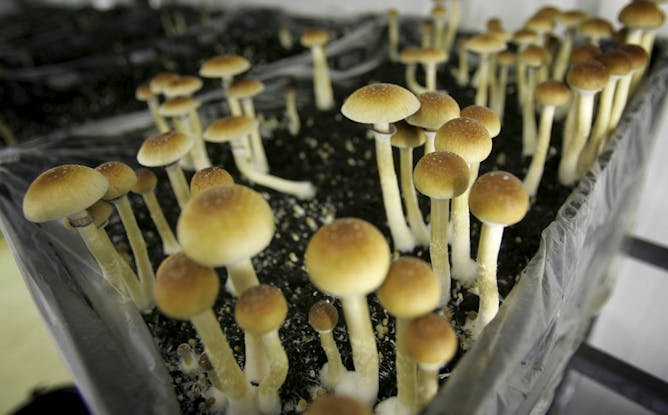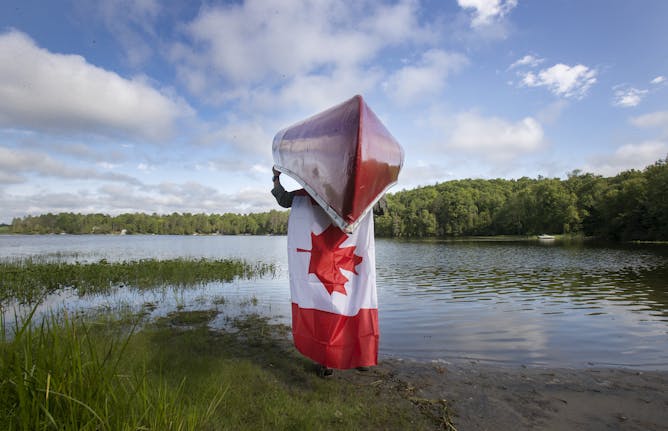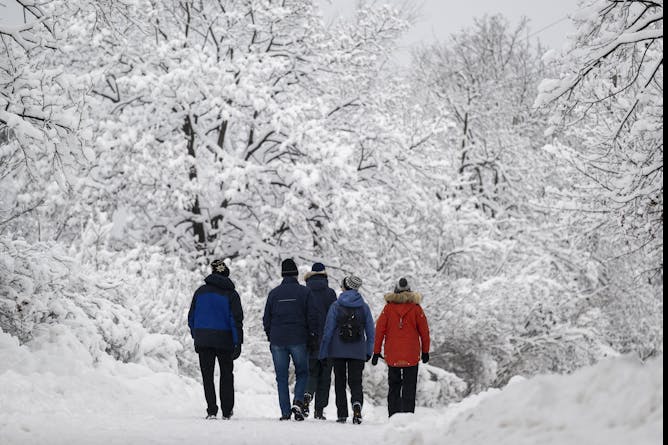|
Alberta’s new regulations on psychedelics to treat mental health issues come into effect today, making it the first province to regulate the use of hallucinogens in therapy.
Today in The Conversation Canada, Erika Dyck of the University of Saskatchewan walks readers through the new regulations, as well as the history, potential and pitfalls of hallucinogens both inside and outside clinical settings.
Psychedelics — from magic mushrooms and ayahuasca to LSD — are having a moment in the spotlight, with celebrity endorsements and a new generation of research on potential clinical uses. There is certainly a need for therapeutics to treat mental health issues, the growing prevalence of which could place a strain on the health-care system.
“Psychedelics are being held up as a potential solution,” Dyck writes. “But, magic mushrooms are not magic bullets.”
Also today:
All the best,
|

Psychedelics are being held up as a potential solution to the growing need for mental health treatment. But, magic mushrooms are not magic bullets.
(AP Photo/Peter Dejong)
Erika Dyck, University of Saskatchewan
Alberta’s new policy on psychedelic-assisted therapy for mental illness may set a precedent that moves Canadians one step closer to accepting psychedelics as medicinal substances.
|

A paddler launches a canoe on Bass Lake in central Ontario on Canada Day, 2021. Could humble Canada be heading towards superpower status in the decades to come?
THE CANADIAN PRESS/Fred Thornhill
Thomas Klassen, York University, Canada
In 1776, with a population of 2.5 million, few imagined that within two centuries, the U.S. would become the dominant superpower. It’s not inconceivable that Canada could do the same by 2223.
|

Cathay Pacific crew members who worked on a flight from Hong Kong arrive at Vancouver International Airport. Canada now requires air travellers from China, Hong Kong and Macau to have a recent negative COVID-19 test result.
THE CANADIAN PRESS/Darryl Dyck
Jennifer Fang, Simon Fraser University; Julianne Piper, Simon Fraser University; Kelley Lee, Simon Fraser University
Canada’s new COVID-19 testing requirement for travellers arriving from China is unlikely to prevent the spread of new subvariants.
|

Understanding our confirmation biases can help us tackle fake news and misinformation.
(Shutterstock)
James Wittebols, University of Windsor
Teaching students about information literacy can help them determine what kinds of practices make news reports trustworthy.
|

Jean-Michel Basquiat’s Toxic, pictured right, is inspired by the American cartoon and denounces the violence of American society.
(MMFA)
John Harbour, Université Laval
In the age of the Black Lives Matter movement, Basquiat’s work is more relevant than ever. It highlights racial inequality and violence against racialized people.
|

L'hiver ne doit pas être un prétexte à demeurer enfermé. Faire des activités physiques extérieures, comme la marche, a de nombreux bienfaits pour la santé.
La Presse canadienne/Justin Tang
Iris Lesser, University of The Fraser Valley; Amanda Wurz, University of The Fraser Valley; Cynthia Thomson, University of The Fraser Valley
Pratiquer une activité physique à l’extérieur a de nombreux bienfaits pour la santé. Voici neuf conseils pour devenir – et demeurer – des adeptes de plein air hivernal.
|
Arts
|
-
Sarah Mills, Loughborough University; Sophie Milnes, Loughborough University
More countries are using ‘national service’, whether they are military or civic programmes.
|
|
Business + Economy
|
-
Nuri Heckler, University of Nebraska Omaha
The hefty sums many billionaires give away place them in an age-old debate about wealth and charity – and whether it’s appropriate for donors to have a say over their wealth from the grave.
|
|
Culture + Society
|
-
Ken Drinkwater, Manchester Metropolitan University; Neil Dagnall, Manchester Metropolitan University
How Prince Harry using a psychic to contact his dead mother, Princess Diana, isn’t that unusual.
|
|
Politics
|
-
Joshua Holzer, Westminster College
Special counsels can help administrations avoid the perception of bias, but politics is never fully out of the picture.
|
|